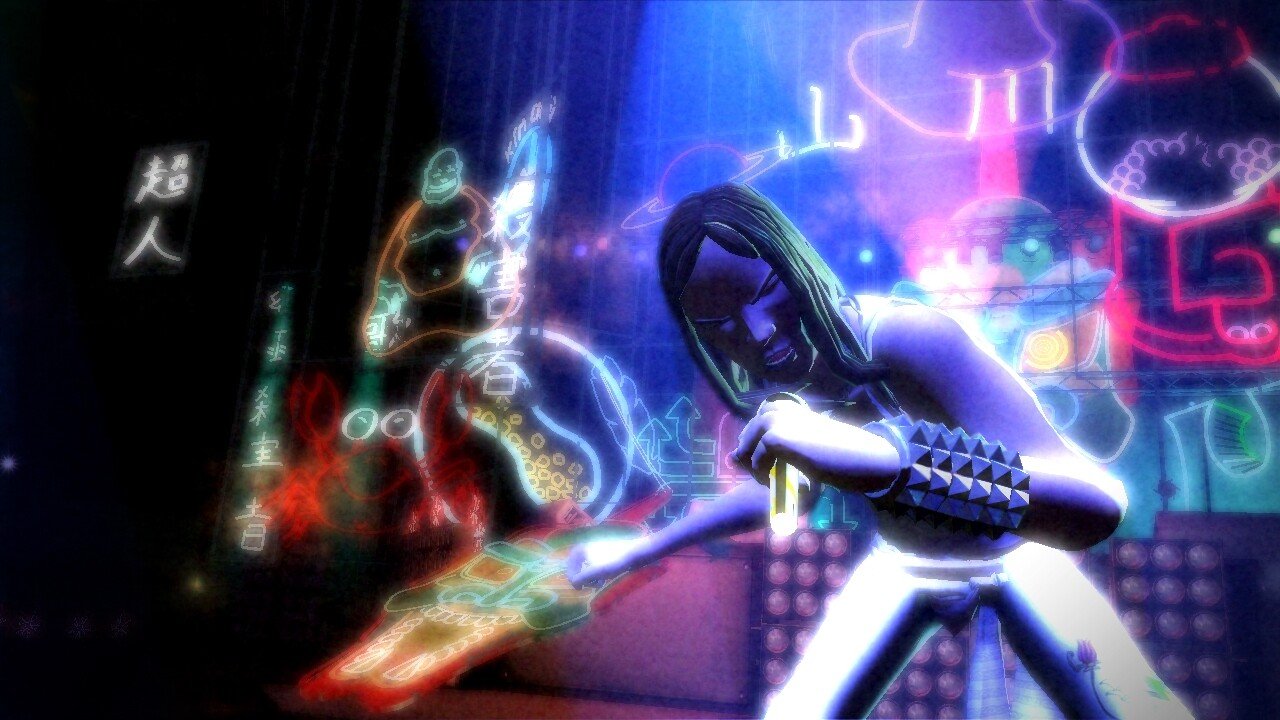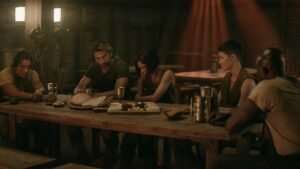These days Harmonix is best known for bringing a fake sense of musical virtuosity to the masses by allowing them to feel like either a rock star or a professional dancer.
Through Guitar Hero, Rock Band and Dance Central the little developer based in Boston has made it clear that they are all about music. But recently Harmonix tried something a little different; a little older, quite frankly. They went beyond the rhythm game genre they’d helped to bring to public awareness and returned to a twitchier, more frantic, arcade-like experience. Rock Band Blitz, though it carried the Rock Band name wasn’t another attempt to tell the familiar story of the rise of a struggling band.
This was all about jumping “lanes” in the infamous note highway, crazed power ups that rocketed your score, and ultimately, bragging and being bragged at on Facebook by your friends. There was still the music you loved, you were just playing it in a new way. So how does a game this different come out of the House That Rock Built? We got a chance to talk to Matthew Nordhaus, the project director of Rock Band Blitz to find out.
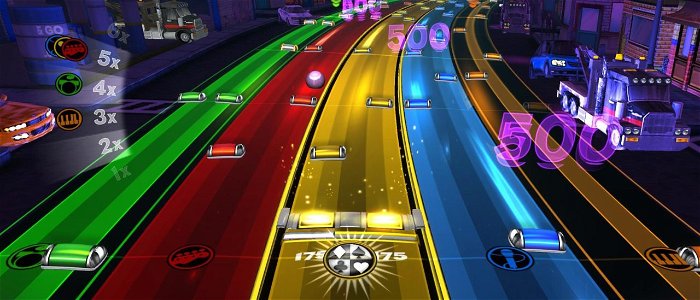
CGMagazine: Tell us a little bit about yourself. How did you end up working in games?
I think the overlords here felt that I had experience in enough different areas to take this oddball idea of user generated content for Rock Band and make it a reality.
Matthew Nordhaus: I was always a nerd, and I loved arcade and PC games growing up, so I got a degree in computer science in college. A friend I met there went to work for Activision making games, and then in 2000 he started a game company. I went to work for him starting as a programmer—and the only employee—and gradually evolved into working as a designer, then a lead designer, then a producer and project director. I’ve been lucky enough to be able to work on a fairly wide variety of games in a number of different roles over the last 12 years.
CGMagazine: What were some of your past projects in the industry?
Matthew Nordhaus: I worked on the first Dungeon Siege expansion, Legends of Aranna, as well as a number of PC Strategy games; Star Trek Armada I and II, and a number of Empire Earth titles. Since coming to Harmonix I’ve primarily worked on the Rock Band Network, our user generated content initiative, and then Rock Band Blitz.
CGMagazine: How did you make the move to Harmonix? The past games you worked on were RPG and combat oriented, it must have been a pretty big leap to get into virtual dance and musicianship.
Matthew Nordhaus: I was hired to run the team making the Rock Band Network, which was a fairly unique undertaking; during the development I was required to do some design, some production, and some project management, all at the same time. There wasn’t really anything quite like it. I think the overlords here felt that I had experience in enough different areas to take this oddball idea of user generated content for Rock Band and make it a reality. In the end, it was hard, but very fun.
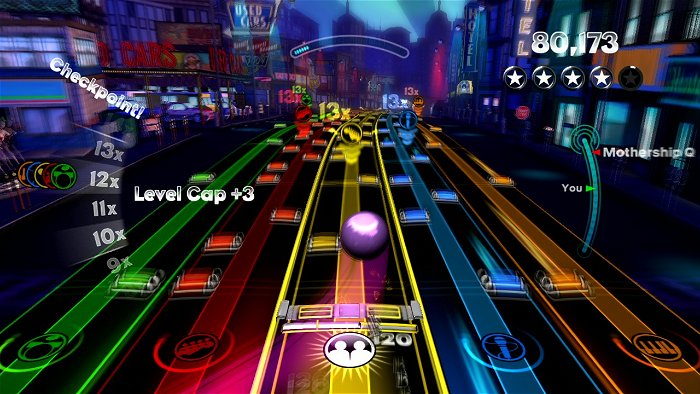
CGMagazine: Up until now, Harmonix has been best known for its virtual “rhythm master” games that make people feel like rock stars or dancers, but Blitz is a definite step back to the Frequency or Amplitude roots. What was the thinking behind that?
The first and primary goal was to allow players to use the enormous Rock Band library without a plastic instrument.MN: It does share some similarities in terms of appearance, but Rock Band Blitz was conceived, from the beginning, as a Rock Band game. The first and primary goal was to allow players to use the enormous Rock Band library without a plastic instrument, so that they could experience the music that they owned in a new way. As we started prototyping it we realized that some of the aspirational themes that have always appeared as the center of Rock Band—“Be a Rock Star”—didn’t make as much sense for a smaller game like Rock Band Blitz. So we focused on making it fast, loud, and fun, like the arcade games that many of us played when we first discovered video games.
CGMagazine: What was the design process like for conceiving Blitz?
Matthew Nordhaus: The design process for Rock Band Blitz involved a great deal of prototyping. We had a playable game running very early in the process, and for nearly three months a small team, just three or four people, banged on many different ideas about how the game could be fun; multiple control schemes, different track layouts, alternate multiplier mechanics, Blitz mode changes, and so on. We tried to rejigger the design over and over again to find the fun. As is true with any game at Harmonix, we have a core group of people who have made many beatmatch games, and we rely on them to guide the development. You could say that every game that we make is beholden to all of our previous games, as we learn and change the way that things behave. All of them are their own special snowflakes, of course, but there are elements of UI and rules about player attention that we have realized are core to the beatmatch experience, so we don’t try to re-invent them.
CGMagazine: With Blitz, Harmonix made a statement that it could still design addictive, twitchy games that appealed to the hardcore, leaderboard gamer. Are we going to see more in this direction?
Matthew Nordhaus: I can’t say that Rock Band Blitz is an indication of some master Harmonix plan. Each time we start a new game we try to make something fun and compelling, and each time the game talks back. We learn something and it helps us decide what to do next. It isn’t always what we expect. [Smiles]
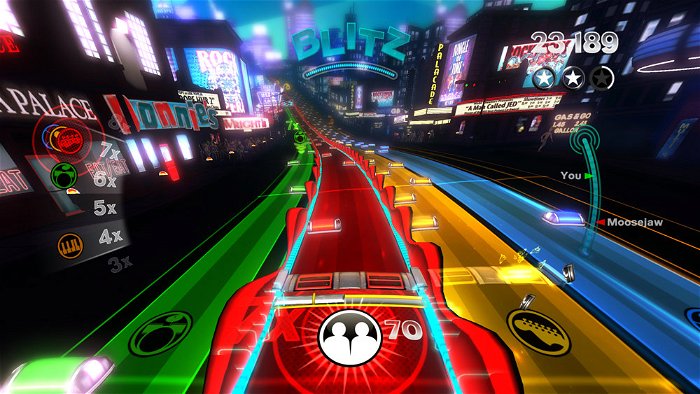
CGMagazine: Will Blitz expand to other social platforms like Google+ for those who can’t or won’t use Facebook?
Matthew Nordhaus: We are always interested in new frontiers for Rock Band World, but right now don’t have any specific plans to expand.
CGMagazine: How did the decision to make it a more social media oriented experience come about?
Matthew Nordhaus: People typically have a much larger friend list on Facebook than they do on their consoles. We suspected that allowing you to play against your Facebook friends might be a richer experience. When you look at leaderboards within Rock Band World, for example, it’s not just that there are more people, you also know who these people are in real life: you can see their picture, their play history, and, most importantly, you can easily taunt and humiliate them when you beat their score…
CGMagazine: Will we ever see a portable version of Blitz? It seems like a good fit for devices like the Vita, 3DS and perhaps phones and tablets.
Matthew Nordhaus: Boy, I would LOVE to play Rock Band Blitz on my tablet. No plans right now though.
CGMagazine: Blitz has shown that music can be an integral part of the traditional action/arcade game experience, but what about other genres? Could Harmonix create an adventure game with music, or an RPG?
Matthew Nordhaus: Absolutely. I firmly believe that the crazy geniuses here at Harmonix could take almost any genre and use music, rhythm, or beatmatch mechanics to make it better. Rock Band has always had an effective narrative arc; take your band from rags to riches, accomplished with just a few cutscenes. For Dance Central 3 we took that narrative design farther and created, frankly, a completely bananas storyline for a dancing game, having to do with time travel and dance battles and…well, you just need to play it. Watching that team flex its narrative muscles was fun. And a little scary. Imagine what they could do if we unleashed them on a narrative based game!
